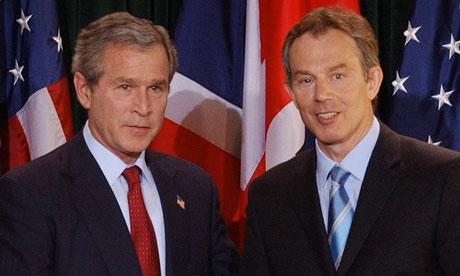
George Bush and Tony Blair in April 2003. A letter shows they had agreed six months before to invade Iraq without a second UN resolution. Photograph: Stefan Rousseau/PA
Britain and the US were planning to take action against Saddam Hussein without a second UN resolution six months before the invasion of Iraq, a newly released letter from the-then prime minister Tony Blair's office shows.
A letter from Blair's private secretary reveals that "we and the US would take action" without a new resolution by the UN security council if UN weapons inspectors showed a clear breach of an earlier resolution by Saddam. In that case, Saddam "would not have a second chance".
That was the only way they could persuade the Bush administration to agree to a role for the UN and continuing work by UN weapons inspectors, the letter says.
He added: "It must be seen only by those with a real need to know its contents, and must not be copied further." He sent it to a number of other senior officials, including Sir Jeremy Greenstock, Britain's ambassador to the UN.
There is no indication that it was seen by Lord Goldsmith, the attorney general, who at the time was advising that, without a fresh UN resolution, invading Iraq would be illegal.
Rycroft's letter referred to a Downing Street meeting on the developing Iraqi crisis attended by Straw, the defence secretary, Geoff Hoon, and the chief of the defence staff, Admiral Sir Mike Boyce. Also present were Jonathan Powell, Blair's chief of staff, Sally (now Lady) Morgan, his director of government relations, Alastair Campbell, his director of communications, and David Manning, his chief foreign policy adviser.
The meeting concluded, wrote Rycroft, that "the only way to keep the US on the UN route was for there to be a clear understanding that if Blix [Hans Blix, the chief UN weapons inspector] reported an Iraqi breach of the first [UN] resolution, then Saddam would not have a second chance".
Rycroft, in a devastating passage, added: "In other words, if for some reason (such as a French or Russian veto) there were no second resolution agreed ... we and the US would take action."
The Downing Street letter is particularly significant against the background of the government's repeated emphasis in public at the time on the need to get UN approval before any invasion of Iraq. The "first resolution" referred to in Rycroft's letter was number 1441, passed unanimously in November 2002.
Goldsmith and most of the government's legal advisers insisted a second UN resolution was needed before military action could lawfully take place.
Blair was placed in an even more difficult position with the Bush administration since, in the event, Blix never reported an unconditional breach of the first resolution by Saddam Hussein.
The Rycroft letter also appears to conflict with Straw's actions at the time. A statement recently released by the Chilcot inquiry revealed that in October 2002 Straw told his French counterpart, Dominique de Villepin, that the US acceptance of the wording of the first UN resolution "implied" a further one was required.
The statement was written by Sir Michael Wood, the Foreign Office's top legal adviser, who also opposed the invasion. It also disclosed that Greenstock told his US counterpart that Britain would state publicly after the resolution was passed "that there needed to be a second resolution".
The issue is at the heart of the continuing and deep arguments over the legality of the invasion. Goldsmith originally advised Blair and Straw that the the first UN resolution did not provide sufficient legal cover for war.
Goldsmith said he changed his mind in February 2003 after a visit to Washington, where Bush's legal advisers told him they had agreed to the wording of 1441 only because it had not crossed America's "red line" – the clear message was that, as far as the US was concerned, no new UN resolution was needed.
Philippe Sands, professor of international law at University College London, said: "The letter of 17 October 2002 is consistent with the conclusion that the prime minister wanted to proceed to action with the US on the basis of a single security council resolution, irrespective of what the law required, and ignoring the views at the time of the Foreign Office legal adviser and the attorney general."
http://gu.com/p/3xgby/tw via @guardian
